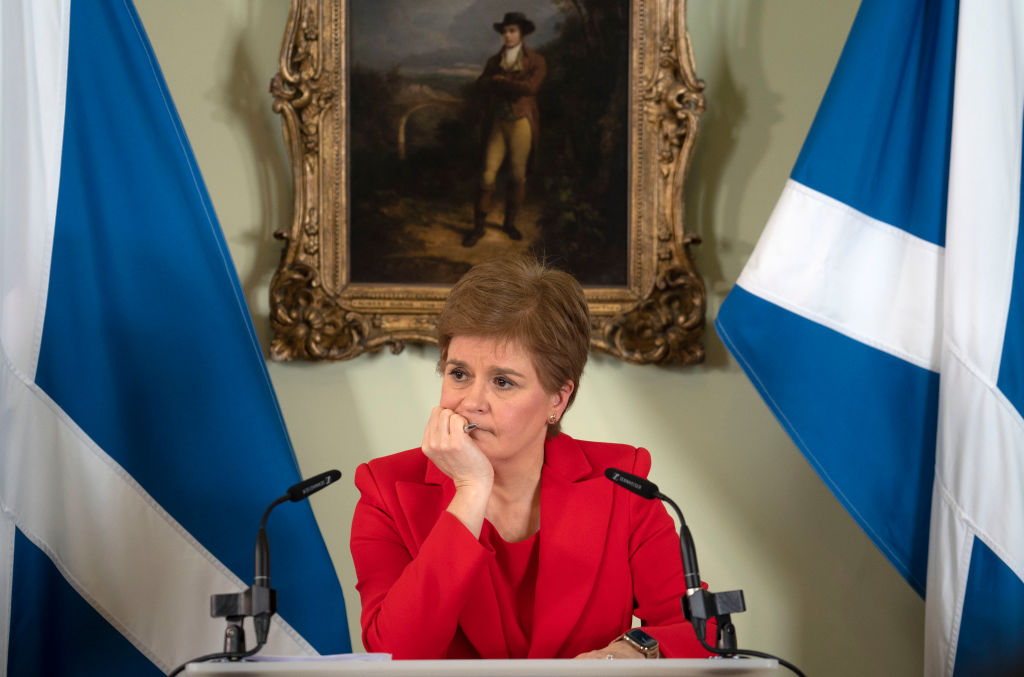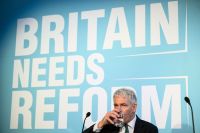Nicola Sturgeon insisted last month she had ‘plenty in the tank’, but apparently the First Minister was already running on empty. Announcing her resignation this morning, Sturgeon said she finally decided to step down only yesterday at the funeral of a long-serving SNP activist. However she also made clear she had begun to realise over the past year she no longer had the energy to give ‘100 per cent’ to the job.
In an emotional press conference at Bute House in Edinburgh, Sturgeon insisted she could have ‘led the party to independence’. But she conceded that her personality was becoming a liability: ‘Fixed opinions about me are becoming a barrier to reasoned debate,’ she said. It was time to hand over the reins to someone, she implied, with a lesser personality.
Sturgeon appealed for politics to become ‘less polarised’ and more consensual. However, she didn’t appear to accept that her own policies might have contributed to that polarisation. The Gender Recogniton Reform Bill, her personal flagship policy, has been blocked by the UK government under Section 35 of the Scotland Act on the grounds that it might damage women’s rights under the UK Equality Act. The scandal of a double rapist, Isla Bryson, being sent to a Scottish women’s prison suggested that this might be a legitimate concern.
None of these individual policy failures really explains Sturgeon’s shock departure
Sturgeon has been increasingly uncomfortable at press conferences when asked if she accepted that Bryson, who changed gender by self-declaration after he was charged, was really a man. She has refused to say, even though he was being sent, at her insistence, to a male prison.
This legislation is now opposed by two thirds of Scottish voters. Critics might say that the ‘irrationality’ she complains about in public discourse has been largely of her own making.
According to her bitter rival and predecessor, Alex Salmond, now leader of the breakaway Alba party, the GRR Bill has also fatally damaged the cause of independence, a cause to which Sturgeon said she had ‘dedicated her adult life’.
Sturgeon said she could have carried on for ‘some months’ but decided she did not have the stamina to persevere with her other headline policy of turning the next general election into a ‘defacto’ referendum.
This proposal, made after the Supreme Court rejected her bill for an advisory referendum, is to be debated at a special conference of the party next month. She said that, because she is unchallenged as SNP leader, her personal authority would ‘carry too much weight’. It is rare indeed for a political leader to stand down because they were too persuasive and in command of their party. Most would love to have such a problem.
Sceptics will see Nicola Sturgeon’s dramatic fall from grace as a consequence of her own policy failures rather than the unreason of her political opponents. She said in 2015 she wanted to be ‘judged on her ability to close the attainment gap in education’. Yet the divergence in educational performance between children born in different social classes remains wide. The National Health Service in Scotland is ‘broken’ according to the chair of the Scottish BMA Dr Iain Kennedy. Homelessness is at record levels, according to Shelter Scotland.
Sturgeon cited ‘fairer taxation’, the £20 child payment and the baby box of free goods for expectant mothers among her achievements. But on some measures, inequality in Scotland is worse than south of the border. Drug deaths are three times higher. The Scottish Government’s deposit return scheme for bottles and cans has been widely criticised by retailers.
Yet none of these individual policy failures really explains Sturgeon’s precipitate departure which has come as a shock to her party. The SNP dominates Scottish politics at every level. Only a year or so ago, the First Minister was basking in acclaim for her handling of the pandemic.
Clearly she has decided to leave the stage while the crowds are calling for more – at least some of them. Her departure leaves the SNP with a huge problem of how to replace the most successful leader in the party’s history. It is often said in politics that no one is indispensable. But Nicola Sturgeon will be a very hard act to follow.







Comments